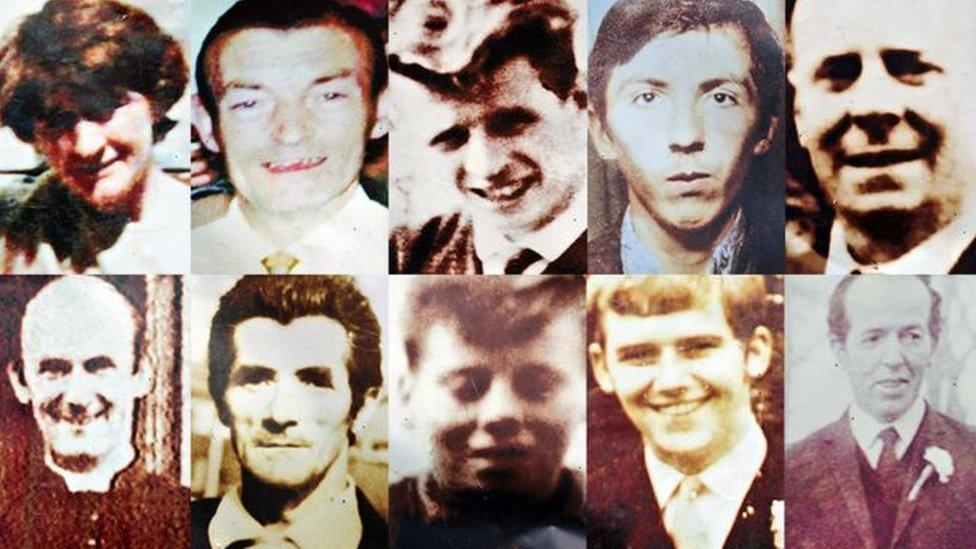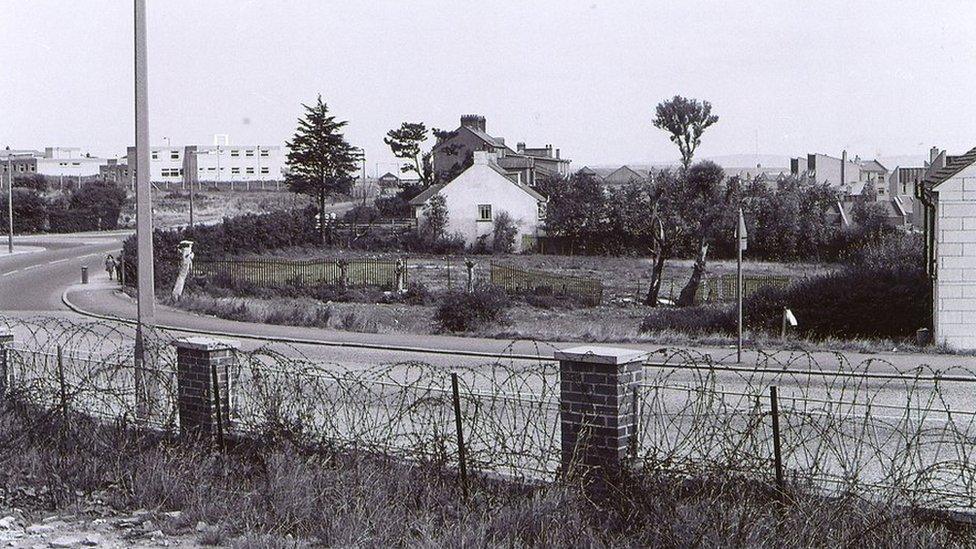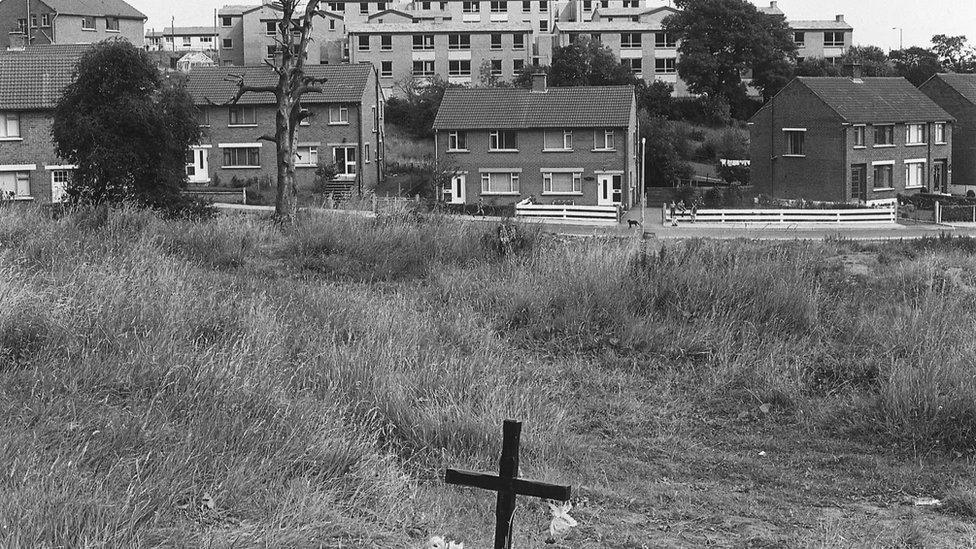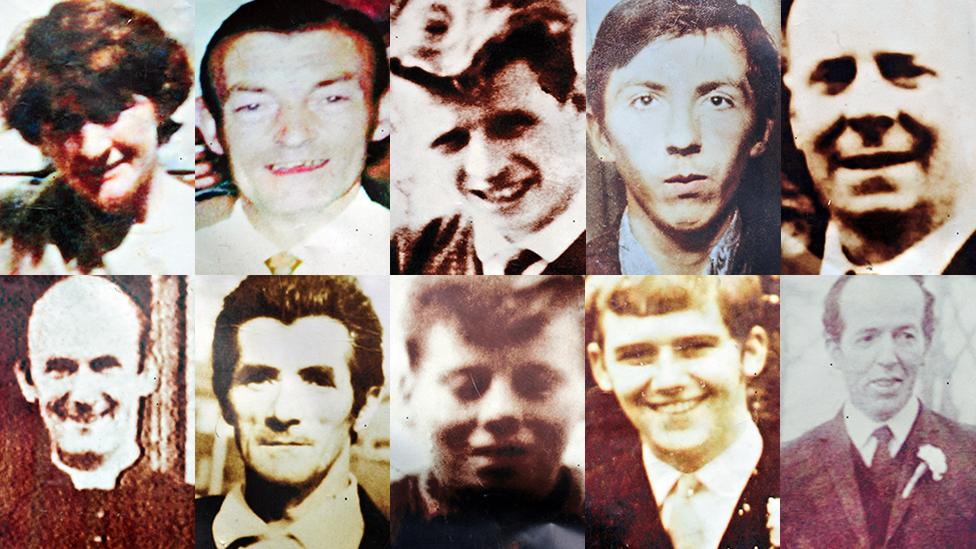Ballymurphy Inquest: Appeal for combatants to come forward
- Published

The inquest is examining the deaths of 10 people in Ballymurphy in 1971
An appeal has been made for soldiers who fired fatal shots in Ballymurphy 48 years ago to come forward, "even at the 11th hour" and "admit what they did".
There was also a call for IRA members who were active in the area at the time to testify about their actions.
The calls came as the Ballymurphy Inquest began hearing its final oral submissions in court in Belfast.
The Coroner, Mrs Justice Keegan, will soon begin to consider her findings, expected to be delivered in 2020.
The inquest is looking into the deaths of 10 civilians over three days in and around the Ballymurphy area in August 1971, immediately after the introduction of internment in Northern Ireland.
Their families say they were shot by the Army, that each of them was unarmed and innocent, and that the shootings were unjustified.
Barristers for the Ministry of Defence (MoD) have argued soldiers only ever opened fire when they perceived they were under threat.
The court heard an assessment from the various legal teams of what the evidence already heard amounts to.
No new evidence was heard on Monday.
'Examine their conscience'
Many soldiers have testified since the inquest began in November 2018, but only one has admitted to opening fire and actually hitting someone.
The appeal to soldiers to "examine their conscience" came from Michael Mansfield QC, who represents the families of several of the victims.
However barristers for the MoD said it was time for members of the IRA to also step forward and state what they did in the area during those days.
One barrister said at no time had the inquest heard evidence from IRA gunmen about firing at the Army, their movements, their weapons, their positions, the rounds fired or their eventual escape.
Another said the IRA had not even attempted to contact the inquest through an intermediary.

Four of the Ballymurphy victims died as a result of shooting in the Manse field
In 1971, soldiers testified that at one stage they were engaging as many as 12 gunmen in just one of the Ballymurphy incidents.
A "interlocutor" for the loyalist paramilitary group the Ulster Volunteer Force (UVF) did come forward to explain what UVF gunmen might have done in Ballymurphy, but in the end he never gave evidence.
In each case the court has heard the view of the next of kin of those who died who died as a result of five separate incidents.
Also in each case the MoD has explained the issues it would like the coroner to remember.
Their versions of what happened have been different.
The MoD also asked the court to remember the context of the times and the explosion of violence which took place as internment was introduced.
'Often unseen and deadly'
One MoD barrister asked the coroner to consider "the reasons for the split-second reaction of a soldier are bound up in the context in which they were operating.
"There were threats, often unseen and deadly".
Soldiers were accused by a barrister for some of the victims' families of "a callous disregard for human life"
Several speakers said in their submissions to the court that they did not want to add to the pain and distress of any of the relatives.
However, Michael Mansfield QC said: "The real pain is the failure of those responsible for the killings to admit either then or now the enormity of what they did.
"Is it to be said that soldiers only have the courage to come forward when they're armed with a weapon, and not when they're not?," he said.
For the MoD, Peter Coll QC countered: "The IRA has chosen not to take any steps to rebut the claims of the soldiers."
The 10 people who died from 9-11 August 1971 were Fr Hugh Mullan, Frank Quinn, Joan Connolly, Noel Phillips, Joseph Murphy, Daniel Teggart, Edward Doherty, Joseph Corr, John Laverty and John McKerr.

The 1971 shootings took place during the introduction of internment without trial
The legal teams for their families said soldiers tried to cover up what they had done when they realised they had killed unarmed civilians.
The MoD has argued soldiers did come under fire, and said they returned fire because of an imminent threat.
However, in one case the MoD submitted it would never be possible to ascertain who had fired the shot which killed 49-year-old John McKerr outside Corpus Christi Church on Westrock Drive.
Much mention was made in court of the existing paperwork from 1971 and what it can tell the coroner.
But it was also pointed out that some documentation has gone missing in the 48 years since the shootings.
There was also consistent argument that the deaths were not properly investigated by the military authorities in 1971.
Claims that some military statements made at the time had been fabricated and adjusted were also repeated.
- Published11 May 2021
